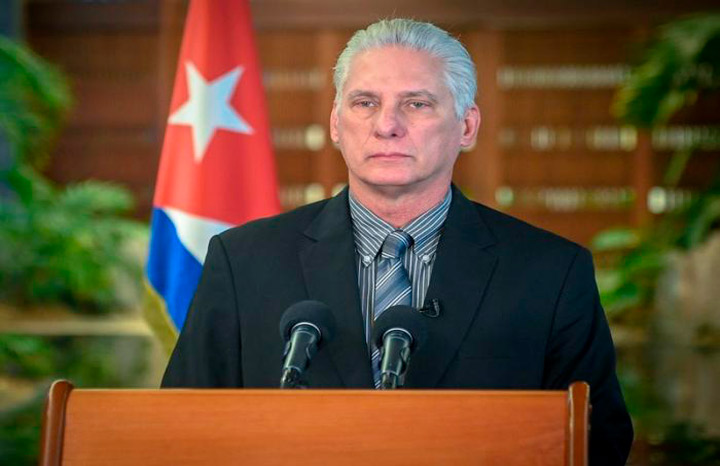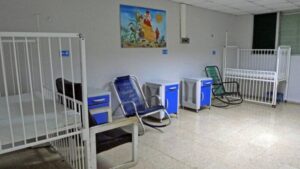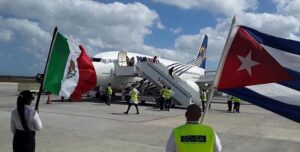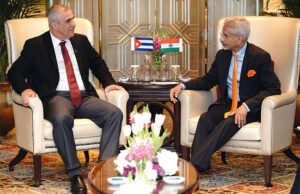Miguel Díaz-Canel Bermúdez, First Secretary of the Central Committee of the Communist Party of Cuba and President of the Republic, highlighted via video link at the World Food Forum, the cooperation with the Food and Agriculture Organization of the United Nations (FAO) with Cuba, which in 2025 is implementing thirteen projects in 59 municipalities across the country, as specified on the website of the Presidency of the Republic.
The President recalled the address by the historical leader of the Cuban Revolution, Commander-in-Chief Fidel Castro Ruz, at the 1996 World Food Summit, where he warned about the urgency of confronting hunger as a global challenge.
Díaz-Canel emphasised that the FAO representation in Cuba, established in 1978, marked the beginning of a key collaboration to strengthen food security and sustainable rural development.
He indicated that the Island has made its capacities available for South-South cooperation, while receiving technical assistance from the FAO in the implementation of public policies, including the Law on Food Sovereignty and Food and Nutritional Security.
The Head of State acknowledged the role of the FAO in the transformation of agri-food systems, confronting climate change and the conservation of biodiversity, as well as in the empowerment of women and young people in rural areas.
At the commemoration of the FAO’s 80th anniversary, he highlighted the importance of this organisation as an essential actor in the pursuit of a world free from hunger and malnutrition, and praised the effort of its workers for the benefit of millions of people.
Díaz-Canel denounced the unilateral coercive measures applied against Cuba, which seek to subdue the people through hunger and need, and mentioned the situation in Gaza, where famine has been constant for the last two years.
Finally, he affirmed that together with the FAO, Cuba will continue to consolidate essential goals to advance towards more efficient, inclusive, resilient, and sustainable agri-food systems.
Due to its importance, the ACN reproduces in full the message from the Cuban President:
Message from Cuban President Miguel Díaz-Canel to the World Food Forum
Dear Mr. Qu Dongyu, Director-General of the Food and Agriculture Organization of the United Nations (FAO)
Greetings from Cuba to all participants in this year’s World Food Forum, a year in which the FAO marks eight decades of uniting efforts to free the planet from one of Humanity’s most terrible plagues: hunger.
I am honoured and stimulated by your invitation to be one of the speakers at the World Food Forum, representing a founding country of the FAO, an organisation with which we share strong and historical ties of cooperation and common objectives in the battle for the eradication of hunger, agricultural transformation, and sustainable rural development.
We are especially inspired to participate in the WFF, considering that its three pillars: youth, science and innovation, and investment, aim to accelerate the transformation of agri-food systems to achieve the Sustainable Development Goals (SDGs), an endeavour we share.
It is impossible to forget at this time that the FAO emerged in a post-war context, with Europe devastated and hunger threatening millions of human survivors of the conflict.
The tragedy of this history is that the challenge the world faced then remains current: achieving a world free from hunger and malnutrition, where food and agriculture contribute to sustainably improving the living standards of all people.
Throughout these eight decades, the world has become more complex, unjust, and risky for tens of millions of human beings, as a consequence of wars, climate change, and the ever-widening gaps between the haves and the have-nots; between the ultra-rich and the dispossessed, the hungry, the outcasts of the market in the neoliberal era.
In this dramatic context, the valuable contribution of the FAO to improving the lives of millions of people across the planet and its support for countries that need and seek to establish sustainable food systems must always be distinguished. Cuba can attest to these efforts and supports.
In 1978, a FAO representation was officially established in Cuba, marking the beginning of a key cooperation to strengthen food security and sustainable rural development.
Our historical leader, Commander-in-Chief Fidel Castro Ruz, was present at the inauguration of the current FAO headquarters in the country in 1992, an expression of the high importance he attached from the very first day to the FAO’s programmes in the country and his constant concern as a promoter of solidarity and brotherhood among peoples for the eradication of hunger and poverty.
His speech at the World Food Summit in 1996 is a momentous event in the FAO’s memory, for his strong warning to the world’s leaders, and I quote: «The bells that toll today for those who die of hunger every day, will toll tomorrow for all of humanity if it did not want, did not know, or was not able to be wise enough to save itself.»
During decades of cooperation, the FAO has been a pillar of support for Cuba, providing technical assistance and necessary resources for the country’s agricultural development, food production, and the consolidation of high-level scientific institutions in the agricultural sector.
Cuba has made its capacities and experience available for South-South cooperation to support other developing countries, exchanging knowledge and learnings with other nations.
Currently, the FAO stands out as a key actor supporting the country in the transformation of agri-food systems, confronting climate change, and the conservation of biodiversity.
The FAO also promotes the empowerment of women and young people in rural areas, fosters the application of science and technology, and facilitates the transfer of knowledge for more efficient, sustainable, and resilient production.
The support to the country in building and implementing public policies to transform local food systems has been important, including the Law on Food Sovereignty and Food and Nutritional Security, as well as other policies and regulations. With FAO support, in 2025, 13 projects are being implemented in Cuba, covering 59 municipalities on the island.
Considering this closeness in purposes and the history we share, the 80th birthday of the FAO is a celebration we feel as our own. And this Forum is further proof of our shared views in confronting the challenges posed by human and animal nutrition in a time that is again darkening due to wars and threats of war, in which some do not hesitate to use hunger as an instrument for the control and subjugation of peoples.
Unilateral coercive measures like the criminal blockade against Cuba, which has lasted for more than six decades and is continuously tightened, betting on the surrender of our people through hunger and need; are applied as another genocidal method against the Palestinians in Gaza. Meanwhile, the unjust international order, the legacies of colonialism, neocolonialism, and the profound poverty induced by these factors, together with climate change, impact vast areas of the Global South.
I cite these facts not to cast a shadow over the celebration we share, but to rightly highlight the extraordinary challenge facing the FAO in these difficult times. And the merit of those who work in the organisation in their effort to erase famine from the planet.
The commemoration of the FAO’s 80 years gives us the opportunity to recognise the work alongside Cuba to achieve better production, better nutrition, a better environment, and a better life, leaving no one behind. Together with the FAO, we continue to consolidate our essential goals in the country, to advance towards more efficient, inclusive, resilient, and sustainable agri-food systems.
Thank you very much.




